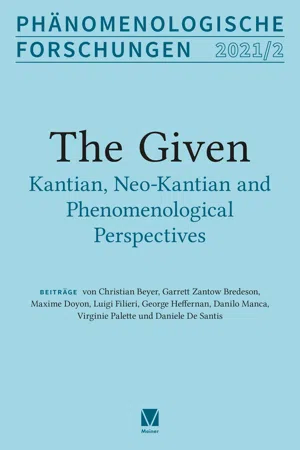
Phänomenologische Forschungen 2021-2
- 181 Seiten
- German
- PDF
- Über iOS und Android verfügbar
Phänomenologische Forschungen 2021-2
Über dieses Buch
AbstractsDe Santis, Daniele, Manca, Danilo: Introduction. The Given: Historical and Hermeneutical Category or Laziness and Perversion of Reason?Filieri, Luigi: Sellars and Kant on Givenness and Intuition.In this paper, I argue that Sellars's conceptualist reading of Kant, though less radical than more contemporary approaches (e. g., Brandom, McDowell), relies on a controversial account of the relations between the givenness of intuitions, the productive imagination and the power of judgment. I will discuss: 1) how Sellars reconsidered Kant's account of intuition; and 2) the kind of conceptualism he argues for. I will raise two main claims. First, Sellars's conceptualist reading of intuition overlooks the role of space and time as givenness conditions. Second, Sellars's account of the productive imagination disregards the complementary significance of the power of judgment in a priori synthesis, the role of which is to grant synthetic unity. My aim is to reconstruct a consistent dialogue between Sellars and Kant by discussing Sellars's reading of a priori synthesis and comparing his views to Kant's original aims.Bredeson, Garrett Zantow: Natorp's Critique of Appeals to Givenness in Light of the Marburg Renewal of Idealism.For Natorp, the most urgent task for turn-of-the-century philosophy consisted in recovering the meaning of idealism. Instead of simply appealing to given facts, idealists transform givennesses of all sorts into tasks for thinking under the guidance of laws which we ourselves have laid down and for which we ourselves are responsible. In this paper I will try to connect the dots between (a) the broader Marburg project of tethering philosophy to the achievements of modern science and (b) Natorp's critique of his contemporaries' appeals to givenness. Understanding this connection is, in my view, crucial for appreciating the sense and grounding of Natorp's idealism.Palette, Virginie: The Resistance of the Given and its Demythologization in Husserl's Phenomenology.The objective of this paper is to reconstruct Husserl's two-pronged approach of sensory givenness. On the one hand, the phenomenological focus on intentional consciousness implies a virulent criticismof the positivistic myth of the sensory given. On the other hand, there is also a positive appeal to sensory givenness in phenomenology, without which phenomenology would not be worthy of its name and would, ultimately, be nothing other than a form of neo-Kantianism. In the context of transcendental genetic phenomenology, Husserl manages to rehabilitate sensory givenness in a reduced, viz. demythologized form. This reconstruction of Husserl's ambivalent reference to the given can help phenomenology defend itself against some actual trends, which tend to reduce it to phenomenalismor to conceptualism.Manca, Danilo: Spontaneity and Givenness. Natorp, Husserl, and Sellars's Neo-Kantianism.In this article, I propose a comparison between Natorp, Husserl, and Sellars that has a twofold aim. First, I ask to what extent Sellars's perspective can be considered to be Neo-Kantian. Second, I demonstrate that the point of divergence among these three thinkers does not have to do with the role they ascribe to givenness in knowledge, but with the way they conceive the activity of thinking. Focusing on Husserl's reading of Natorp's theses concerning the subjective and objective ground of knowledge, I show that both Natorp and Husserl agree with Sellars on the limits of a positivistic and empiricist perspective that relies on what is given in perception for the justification of one's epistemic beliefs. On the other hand, the differences between the three thinkers emerge as soon as we consider how they attempt to integrate the spontaneity of thinking into the sphere of intuition from a renewed Kantian perspective.De Santis, Daniele: Thought, Being, and the Given in Hans Vaihinger's Die Philosophie des Als Ob.
Häufig gestellte Fragen
Information
Inhaltsverzeichnis
- Cover
- Inhaltsverzeichnis
- Daniele De Santis & Danilo Manc
- Luigi Filieri Sellars and Kant on Givenness and Intuition
- Garrett Zantow Bredeson Natorp’s Critique of Appeals to GivennessinLight of the Marburg Renewal of Idealism
- Virginie Palette The Resistanceofthe Given andits Demythologization in Husserl’s Phenomenology
- Danilo Manca Spontaneity and Givenness
- Daniele De Santis Thought, Being, and the Given in Hans Vaihinger’s Die Philosophiedes Als Ob
- Christian Beyer Husserls Verhältnis zu Lotze im Lichte seines Göttinger Seminars über „Lotzes Erkenntnistheorie“
- George Heffernan Existential Evidence
- Maxime Doyon La Gestalt d’autrui
- Autorinnen und Autoren